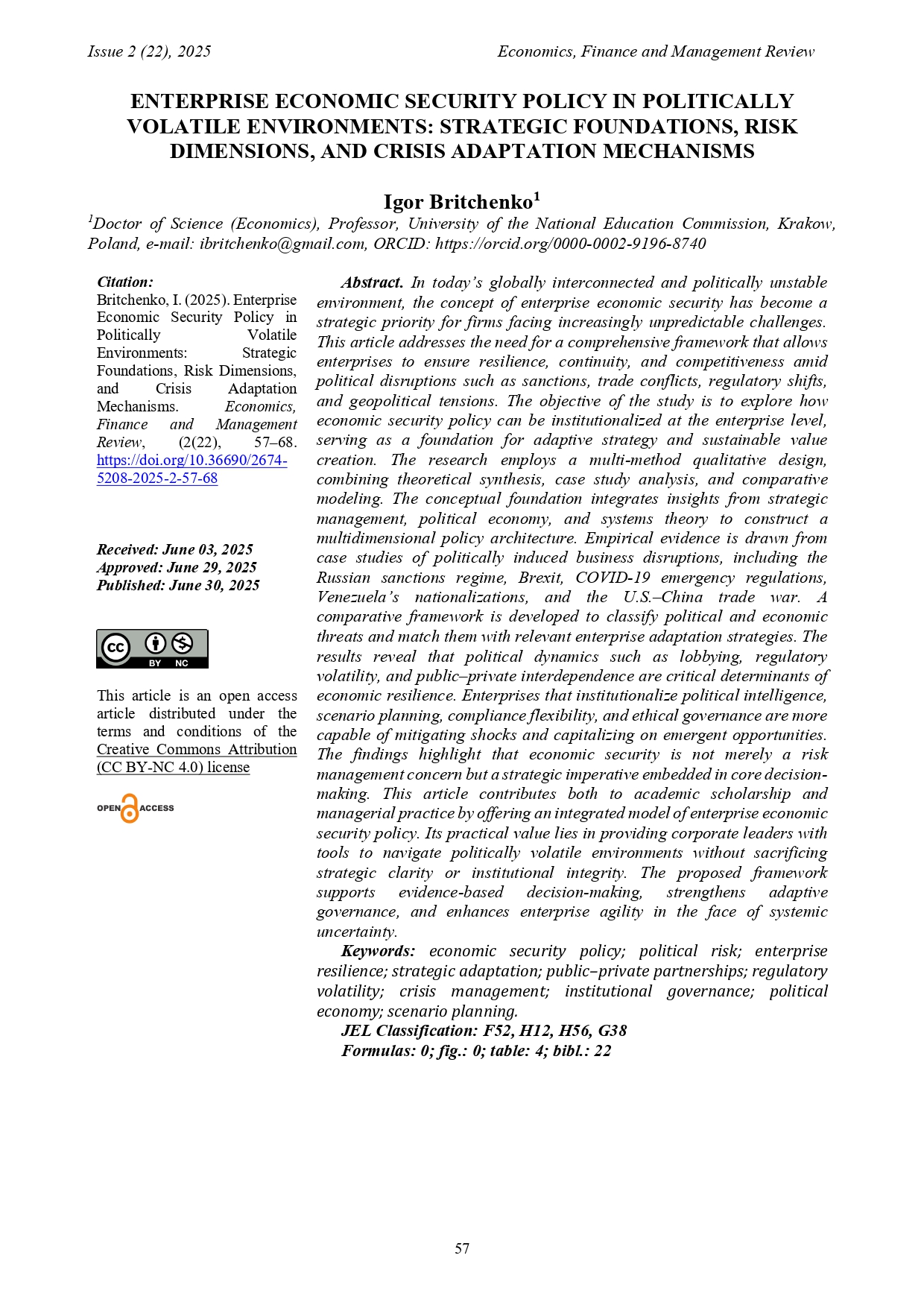ENTERPRISE ECONOMIC SECURITY POLICY IN POLITICALLY VOLATILE ENVIRONMENTS: STRATEGIC FOUNDATIONS, RISK DIMENSIONS, AND CRISIS ADAPTATION MECHANISMS
DOI:
https://doi.org/10.36690/2674-5208-2025-2-57-68Abstract
In today’s globally interconnected and politically unstable environment, the concept of enterprise economic security has become a strategic priority for firms facing increasingly unpredictable challenges. This article addresses the need for a comprehensive framework that allows enterprises to ensure resilience, continuity, and competitiveness amid political disruptions such as sanctions, trade conflicts, regulatory shifts, and geopolitical tensions. The objective of the study is to explore how economic security policy can be institutionalized at the enterprise level, serving as a foundation for adaptive strategy and sustainable value creation. The research employs a multi-method qualitative design, combining theoretical synthesis, case study analysis, and comparative modeling. The conceptual foundation integrates insights from strategic management, political economy, and systems theory to construct a multidimensional policy architecture. Empirical evidence is drawn from case studies of politically induced business disruptions, including the Russian sanctions regime, Brexit, COVID-19 emergency regulations, Venezuela’s nationalizations, and the U.S.–China trade war. A comparative framework is developed to classify political and economic threats and match them with relevant enterprise adaptation strategies. The results reveal that political dynamics such as lobbying, regulatory volatility, and public–private interdependence are critical determinants of economic resilience. Enterprises that institutionalize political intelligence, scenario planning, compliance flexibility, and ethical governance are more capable of mitigating shocks and capitalizing on emergent opportunities. The findings highlight that economic security is not merely a risk management concern but a strategic imperative embedded in core decision-making. This article contributes both to academic scholarship and managerial practice by offering an integrated model of enterprise economic security policy. Its practical value lies in providing corporate leaders with tools to navigate politically volatile environments without sacrificing strategic clarity or institutional integrity. The proposed framework supports evidence-based decision-making, strengthens adaptive governance, and enhances enterprise agility in the face of systemic uncertainty.
Downloads
References
Amiti, M., Kong, S., & Weinstein, D. (2025, February 5). U.S. imports from China have fallen by less than U.S. data indicate. Liberty Street Economics – Federal Reserve Bank of New York. https://libertystreeteconomics.newyorkfed.org/2025/02/u-s-imports-from-china-have-fallen-by-less-than-u-s-data-indicate/
Bennett, A., & Feldman, S. (2022). Political risk and institutional adaptation: Firms navigating volatile environments. Journal of International Business Policy, 5(3), 215–231. https://doi.org/10.1057/s42214-022-00125-w
Bown, C. P. (2022, May 19). Four years into the trade war: Are the U.S. and China decoupling? Peterson Institute for International Economics. https://www.piie.com/blogs/realtime-economics/2022/four-years-trade-war-are-us-and-china-decoupling
Bown, C. P. (2022, May 19). Four years into the trade war: Are the U.S. and China decoupling? Peterson Institute for International Economics. https://www.piie.com/blogs/realtime-economics/2022/four-years-trade-war-are-us-and-china-decoupling
Bremmer, I. (2018). Us vs. them: The failure of globalism. Portfolio/Penguin.
Buggea, E., & Khanna, P. (2021). Strategic foresight for enterprise resilience. Harvard Business Review, 99(4), 58–66.
Dhingra, S., Ottaviano, G., Sampson, T., & Van Reenen, J. (2017). The impact of Brexit on foreign investment in the UK. Centre for Economic Performance. https://cep.lse.ac.uk/pubs/download/brexit03.pdf
Doh, J. P., Lawton, T. C., & Rajwani, T. (2012). Advancing nonmarket strategy research: Institutional perspectives in a changing world. Academy of Management Perspectives, 26(3), 22–39. https://doi.org/10.5465/amp.2012.0041
European Central Bank. (2021, May). The economic impact of Brexit on the UK and EU economies. ECB Economic Bulletin, Issue 5. https://www.ecb.europa.eu/press/economic-bulletin/focus/2021/html/ecb.ebbox202105_03~267ada0d38.en.html
Hall, P. A., & Soskice, D. (2001). Varieties of capitalism: The institutional foundations of comparative advantage. Oxford University Press.
Henisz, W. J. (2000). The institutional environment for multinational investment. Journal of Law, Economics, and Organization, 16(2), 334–364. https://doi.org/10.1093/jleo/16.2.334
Henisz, W. J. (2016). Corporate diplomacy: Building reputations and relationships with external stakeholders. Greenleaf Publishing.
International Monetary Fund. (2015). Russian Federation: 2015 Article IV Consultation. IMF Country Report No. 15/211. https://www.imf.org/external/pubs/ft/scr/2015/cr15211.pdf
Kaplan, R. S., & Mikes, A. (2012). Managing risks: A new framework. Harvard Business Review, 90(6), 48–60.
Kobrin, S. J. (1979). Political risk: A review and reconsideration. Journal of International Business Studies, 10(1), 67–80. https://doi.org/10.1057/palgrave.jibs.8490631
Office for Budget Responsibility. (2023). Economic and fiscal outlook – March 2023. https://obr.uk/efo/economic-and-fiscal-outlook-march-2023/
Porter, M. E. (1985). Competitive advantage: Creating and sustaining superior performance. Free Press.
Rodrik, D. (2020). Why does globalization fuel populism? Economics, culture, and the rise of right-wing populism. Annual Review of Economics, 12, 133–170. https://doi.org/10.1146/annurev-economics-080919-023528
Springford, J. (2022). The cost of Brexit: December 2022 update. Centre for European Reform. https://www.cer.eu/insights/cost-brexit-december-2022-update
The Times. (2023, March 21). Predictions of £40bn hit to public finances from Brexit correct, say economists. https://www.thetimes.co.uk/article/predictions-of-40bn-hit-to-public-finances-from-brexit-correct-bzr63nw8d
World Bank. (2016). Russia Economic Report No. 35: The long journey to recovery. https://documents.worldbank.org/en/publication/documents-reports/documentdetail/173631468197398498/russia-economic-report-no-35-the-long-journey-to-recovery
Yale Chief Executive Leadership Institute. (2023). Over 1,000 companies have curtailed operations in Russia—but some remain. https://www.yalerussianbusinessretreat.com/

Downloads
Published
How to Cite
Issue
Section
License

This work is licensed under a Creative Commons Attribution-NonCommercial 4.0 International License.








